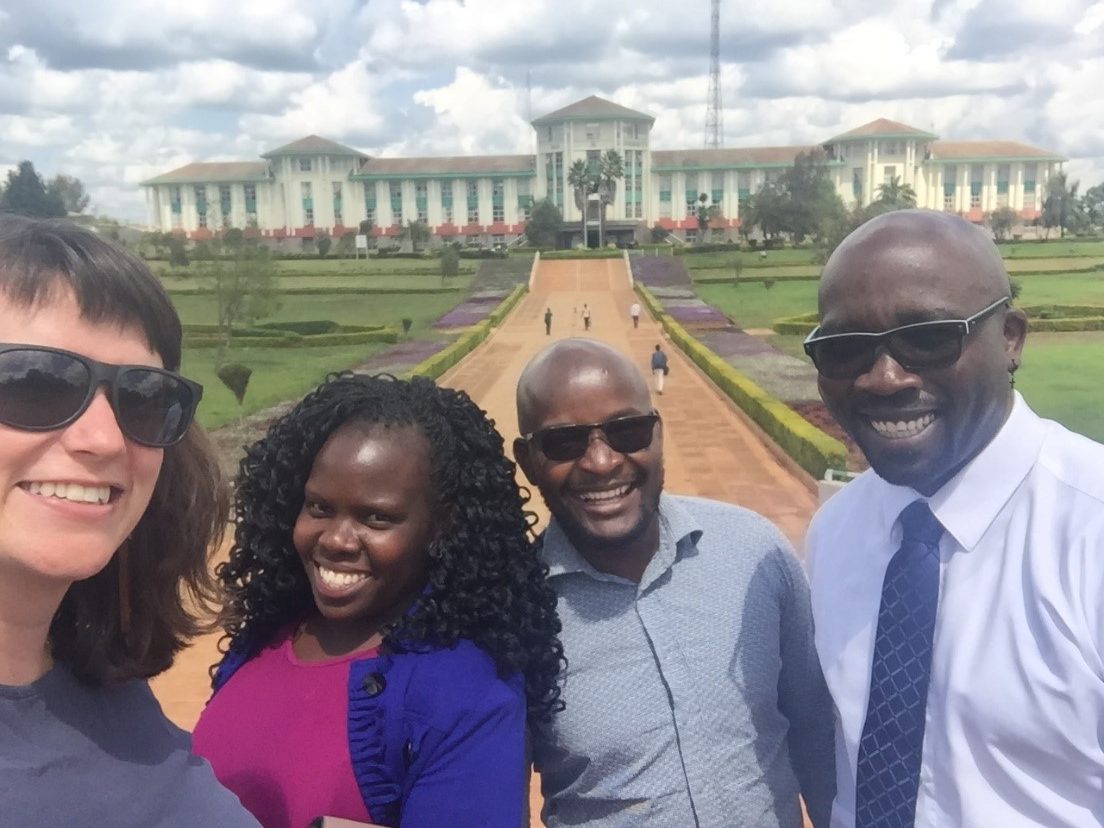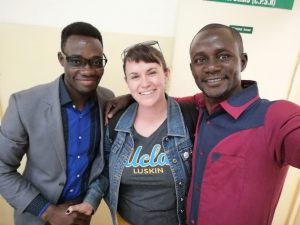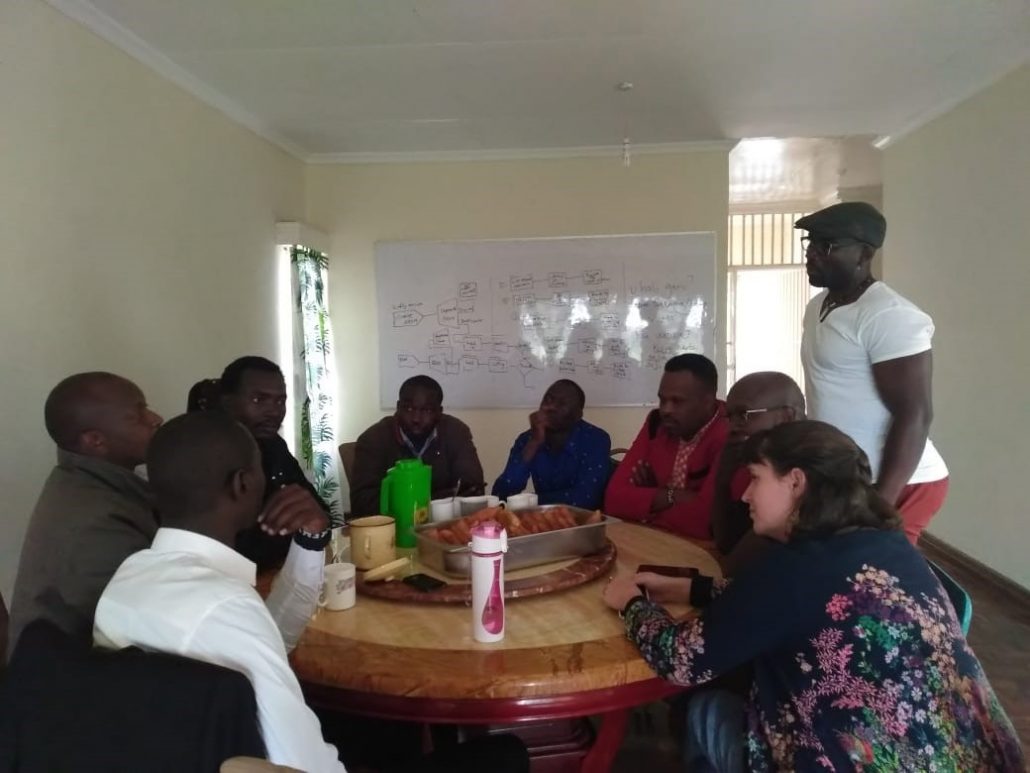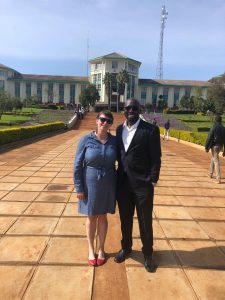Finding a Global Grad Student Community on a Rural University Campus in Kenya
 By Charlotte Fagan, MURP ’20
By Charlotte Fagan, MURP ’20
This summer with the support of Global Public Affairs and Hilton Summer Scholars, I interned at the Center for Public Sector Reform in Kesses, Kenya. The Center for Public Sector Reform (CPSR) is a think-tank based at Moi University, which is one of the largest public universities in Kenya. CPSR is a member of the UN Sustainable Development Solutions Network, and my work with the center focused on creating a curriculum to teach students and local government officials about the sustainable development goals (SDGs). Going into the internship, I was looking forward to becoming more familiar with the SDGs and to gain experience working at a research center, as I had previously worked with small businesses and grassroots organizations in Kenya. However, I was not expecting to find and befriend the thriving graduate student community at Moi, which was the most impactful part of my summer experience.

Officemates Serge and Youseff from Benin studying the economic impact of remittances in Benin.
Kesses is not a town most people have heard of before, as it’s an hour outside the small city of Eldoret in Central Kenya. Spending the summer in Kesses is the equivalent of spending the summer in a small US college town. Most businesses in Kesses are centered around students, and once the undergrads left campus a couple weeks into my stay, the town became very quiet. Like a lot of Midwest small college towns, Kesses is also surrounded by corn fields and farms, and the university lets local farmers graze their cattle across the 4,000-acre campus. As a visitor, staying on a campus in a rural setting was a great way to quickly get to know other graduate students, because there were few distractions in Kesses.
Despite it being summer, I was surprised to find many graduate students on campus, and that these graduate students came from all over Africa. Moi University is home to a few different programs that host graduate students from all over the continent, most notably, it hosts the African Center for Excellence, funded by the World Bank. In my short time on campus, I met students from at least 10 different countries across Africa studying everything from public administration to forced migration to industrial engineering. Students’ master and PhD theses ranged from assessments of gender interactions at primary schools in Mozambique, transforming algae into biofuel in Sudan, comparing the economic impacts of refugee policy in Uganda and Kenya, among many other projects. I met many passionate students who were pursuing interesting and ambitious projects.

Tea and Mandanzi Grad Student Social.
Just like in the US, when you bring together a group of graduate students, people tend to gravitate towards familiar topics – grumbling about lack of funding, eagerness to get started on fieldwork, and complaining that their advisor’s don’t respond to their emails – and conversations get animated when everyone’s favorite topic comes up: politics. In my previous trips to Kenya, I have always admired the spirited debates my Kenyan friends have about politics. The same was true on campus over the summer. I listened in on debates about the pros and cons of democracy, how to tackle corruption, conversations about the Africa Union’s recent proposal for a continental free trade block, and the recent turns in US and Chinese foreign policy in Africa.
These debates almost always got very loud, but they never got angry. Even when students had opposing views, they could yell at each other and say that the other person’s candidate was a “lying, corrupt, drunkard” (direct quote) and still laugh at the end of the conversation. My fellow UCLA colleague Alex Oloo and I hosted a tea and mandazi (local donuts) grad student social, and it turned into a particularly heated debate about East African politics. At the end, I commented to the group that it often feels like these sorts of debates don’t happen anymore in the US. In America, if you know that you don’t politically agree with someone, you just don’t talk about politics. For me, it was refreshing to sit in on students debating and challenging one another.

With fellow Bruin Alex Oloo.
And those same students challenged me in ways that took me off guard. I was surprised to find how many students liked President Trump, and I found myself in the productive exercise of debating why I don’t agree with his policy positions as opposed to just who he is as a person, and framing those arguments in terms of global politics rather than national politics. In many debates about democracy I defended the merits of democracy as many colleagues did not take as a given that democracy is the only or best form of governing. Having to articulate why I believe in democracy taught me a lot about what I take for granted about democratic institutions.
I’m grateful to the many graduate students at Moi this summer who talked to me about their research, let me sit-in on their debates, and especially grateful to those who challenged me to articulate my beliefs in new ways. The nice thing about spending the summer in a rural college town was that we only had one another to entertain ourselves. I’m sure if I had spent the summer on a campus in Nairobi, that I would not have had the opportunity to make such good friendships with the graduate students on campus.




